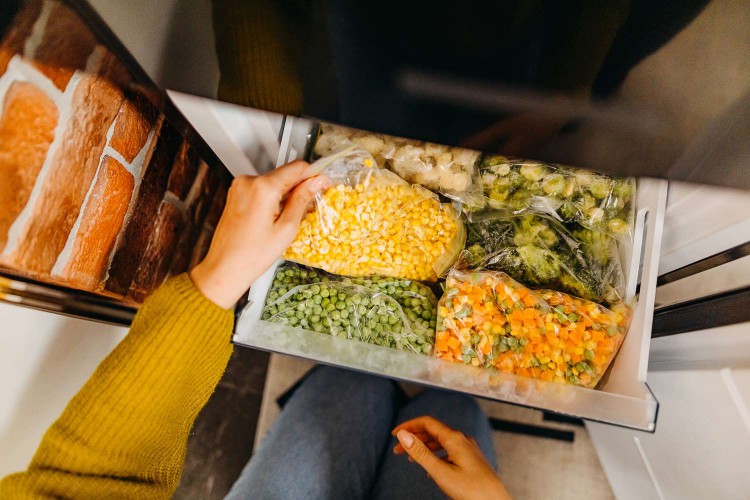Does Freezing Food Change Its Nutritional Value?
- Freezing food rarely changes a food’s nutritional value, and if it does, these changes are very minor.
- The freezing process can actually help better preserve certain nutrients, like those in fruits and vegetables.
- Experts recommend following proper freezing methods, like putting frozen foods in the freezer immediately after getting home from the grocery store and properly defrosting food in the refrigerator.
When it comes to the nutritional makeup of food, how it’s stored can make a difference.
While putting leftover rice or pasta in the fridge can create resistant starch and increase potential health benefits, freezing food to reheat later doesn’t necessarily change the food’s nutritional makeup.
According to the United States Department of Agriculture (USDA), there is little change in nutritional value during freezer storage.
But ultimately, whether or not freezing food changes the nutritional makeup depends on the exact food being frozen, and whether or not it’s blanched or cooked first.
The frozen crystals that are formed when something is frozen is the biggest reason certain nutrients may be lost, explained Kelsey Costa, MS, RDN, a registered dietitian and nutrition consultant.
“These crystals can break down cell walls, leading to a slight loss of certain nutrients, such as vitamins C and B vitamins, which are water-soluble,” she told Health.
Costa added that these losses are typically very minor, and further research is needed to fully understand how freezing food may impact its nutritional makeup.
Here’s how the freezer might impact food, as well as safety tips for freezing, defrosting, and reheating foods.

Getty Images/StefaNikolic
Freezing Food May Actually Preserve Nutrients
When done properly, experts say freezing food can preserve nutritional makeup in foods compared to other food preservation methods.
“The freezing process can preserve the nutrients in food to some extent by slowing down the loss of vitamins that would occur over time if the food were kept at room temperature or in the fridge,” Costa explained.
Frozen fruits and vegetables, for instance, can be flash frozen within hours of being harvested at peak ripeness, allowing those nutrients to be sealed in, Rahaf Al Bochi, RDN, LD, owner of Olive Tree Nutrition LLC and spokesperson for the Academy of Nutrition and Dietetics, told Health.
On the other hand, she said that fresh produce might lose some of those nutrients in the time it takes to ship to grocery stores.
Kirkpatrick pointed to a 2017 comparison study on the nutrient makeup of fresh, fresh frozen, and fresh-stored fruits and vegetables. Fresh-stored food was defined as being kept in the refrigerator for five days, or the average length of time-based on consumer behavior.
The findings showed no significant differences in assessed vitamin contents. Where significant differences were found, frozen produce outperformed “fresh-stored” more frequently than “fresh-stored” outperformed frozen.
The study’s authors concluded that their findings disprove the belief that fresh food has significantly greater nutritional value than frozen counterparts.
Is Frozen Food Healthy?
According to Kirkpatrick, the health benefits of frozen food depend on factors like whether or not there are additives in the food and how far off it is from its natural state. While home-cooked meals tend to be better in nutritional quality, Costa added that many commercially frozen foods can be comparable, assuming the ingredients are high quality without excessive additives. These foods can also be more affordable and accessible, making them a valuable option for those on a budget, she said.
5 Healthy Reasons This Nutritionist Buys Frozen Fruits and Veggies
Important Tips For Defrosting and Reheating Frozen Food
According to Al Bochi, the reheating methods to optimize nutrients in frozen foods are steaming, microwaving, stir-frying, or air frying.
“Steaming is a better option than boiling, as it reduces the leaching of water-soluble vitamins into the cooking water,” Costa said.
Kirkpatrick pointed to a 2015 study conducted on different methods of defrosting broccoli found less overall nutrient losses in quickly defrosting using the microwave method compared to longer boiling times.
She explained that what appears to matter most is defrosting time.
“Prolonged time may negatively impact nutrients,” Kirkpatrick said. “Boiling for shorter times seemed to retain carotenoids in broccoli whereas microwave defrosting had a negative impact on broccoli. However, short microwave defrosting showed a less adverse effect."
Massive Frozen Fruit Recall Affects Products Sold at Walmart, Target, and Other Stores
Safety Tips for Freezing Food
General safety tips for freezing food include blanching vegetables before freezing, storing frozen foods at zero degrees Fahrenheit, and using all frozen food within the suggested storage time to maintain the highest level of nutritional quality.
Frozen fruits and vegetables, in particular, should be consumed within 8-to-12 months for optimal quality, but even still, keeping these foods in the freezer longer will not cause a food safety issue.
Costa noted that following the USDA’s guidelines is crucial.
The freezing and food safety guidelines mention overwrapping the original packaging, which can prevent quality deterioration over time. Rapid freezing, or freezing food as quickly as possible, also helps maintain food quality by preventing the formation of large, disruptive ice crystals.
It’s also worth noting that frozen foods should be immediately put in the freezer once you’re home from the grocery store, Jill Roberts, PhD, an associate professor specializing in food safety at the University of South Florida College of Public Health, told Health.
She added that freshly prepared foods that you intend to freeze should be frozen within two hours of preparation.
How to Safely Defrost Food
Roberts recommends people thaw frozen food in the refrigerator, in the microwave, or as part of the cooking process.
“Never defrost on the countertop or in a sink of warm water as these allow microbes to grow fast,” she told Health.
Food Safety Experts Share 18 Things They’d Never Do In Their Own Kitchens
